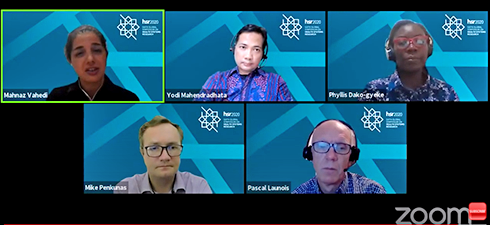TDR hosted a virtual session at the Sixth Global Symposium on Health Systems Research on 9 November with contributions from research capacity building partners in Ghana, Indonesia and Malaysia.

The session, titled “Building implementation research capacity to advance service delivery innovations for neglected tropical diseases control,” introduced the audience to the TDR-supported postgraduate training scheme and Regional Training Centres, as well as new steps for further developing implementation research training programmes. The session, which was moderated by Dr Mahnaz Vahedi, featured the following presentations, which can all be viewed here:
- TDR: Building the science of solutions (Dr Pascal Launois, TDR, Geneva, Switzerland)
- Building implementation research capacity through the Postgraduate Training Programme: Lessons learned from Universitas Gadjah Mada (Dr Yodi Mahendradhata, Gadjah Mada University, Yogyakarta, Indonesia)
- Strengthening implementation research capacity through the Postgraduate Training Programme and regional trainings (Dr Phyllis Dako-Gyeke, School of Public Health, University of Ghana, Accra, Ghana)
- Designing the next generation of implementation research training for learners in low- and middle-income settings (Dr Mike Penkunas, United Nations University International Institute for Global Health, Kuala Lumpur, Malaysia)
A Q&A session following the presentations led to some illuminating discussions on implementation research.
How can we best communicate and generate demand for implementation research from global health partners?
Dr Penkunas: It’s important to explain the difference between implementation research and clinical research as well as the difference between implementation outcomes and clinical outcomes. For implementation outcomes, this includes describing what we want to improve, such as uptake, adoption, accessibility, or acceptability of health interventions. |
Credit: UNU-IIGH |
 Credit: Gadjah Mada University | Dr Mahendradhata: When communicating with partners, try to understand what is their main area of interest and perspective, and frame it from there to bring them toward implementation issues. For example, a global health partner asked me, what can we bring to COVID-19 research? At the moment, research on clinical vaccine technologies is saturated, but there is hardly anyone doing research on implementation challenges of COVID vaccines: once the vaccines are here, how do you get them to the people who need it? That’s an entire science in itself. So start with their interest, vision, and mission and bring that to implementation challenges. |
Considering the current COVID-19 pandemic, are former TDR grantees working on COVID-19 research in their countries?
Dr Launois: We have sent a questionnaire to around 250 alumni of the TDR postgraduate training scheme, and we received responses from 143 (69%) of them. Among them, 45% said they are involved in COVID-19 research, and of those, 91% in 47 countries said they are applying skills learned during their masters training on implementation research. (For more details, please see the published report.)
What does implementation research ethics entail?
Dr Dako-Gyeke: The Ethics in implementation research 3-day short course designed by TDR targets both people who sit on ethics boards and committees as well as implementation researchers. Usually, health researchers are familiar with methodologies for clinical trials conducted in controlled settings, but not with methodologies for implementation research in real-life settings. So with this course, we orient people so they understand the different principles that are applied when we are talking about ethics within implementation research. |
|
How does implementation research fit with operational research?
Dr Launois: There are different definitions for each of these, but the concepts of both are quite similar – they both aim to strengthen health services and improve health care delivery for reaching the right people at the right time. TDR is also involved with operational research through the Structured Operational Research Training IniTiative (SORT IT).



